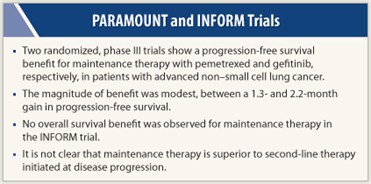Maintenance therapy with either pemetrexed (Alimta) or gefitinib (Iressa) achieved modest improvements in progression-free survival in patients with advanced non–small cell lung cancer (NSCLC). The magnitude of improved progression-free survival was 1.3 months and 2.2 months, respectively, in the two studies. No improvement in overall survival (OS) was found in the INFORM trial, and OS data were not reported for PARAMOUNT.
PARAMOUNT Trial
 Maintenance therapy with pemetrexed improved progression-free survival in patients with advanced NSCLC who were treated with pemetrexed as part of their upfront chemotherapy regimen in the phase III randomized PARAMOUNT trial.1
Maintenance therapy with pemetrexed improved progression-free survival in patients with advanced NSCLC who were treated with pemetrexed as part of their upfront chemotherapy regimen in the phase III randomized PARAMOUNT trial.1
“Pemetrexed has been shown to be effective maintenance therapy in patients with nonsquamous NSCLC who had not received the drug as part of chemotherapy. This trial includes patients who were already treated with four courses of pemetrexed as part of induction chemotherapy,” explained Luis G. Paz-Ares, MD, Virgen del Rocio University Hospital, Seville, Spain.
“The study met its primary endpoint by showing significantly improved progression-free survival in patients continued on treatment with pemetrexed. We believe the magnitude of benefit is clinically significant and may support the use of pemetrexed as maintenance therapy,” Dr. Paz-Ares stated.
The trial enrolled 539 patients who responded to four cycles of pemetrexed plus cisplatin induction chemotherapy to receive continuing pemetrexed plus best supportive care or placebo plus best supportive care every 21 days in a 2:1 ratio. Both arms got folic acid and vitamin B12 supplementation. Maintenance therapy was continued until disease progression.
Median age was 61 years, about 60% were males, the majority were Caucasian, and 80% were ever-smokers; 90% had stage IV NSCLC and 10% had stage IIIB disease; 88% had adenocarcinoma histology.
Key Data
For the primary endpoint of investigator-assessed progression-free survival, pemetrexed was statistically superior to placebo: Median progression-free survival was 4.1 months in the pemetrexed arm vs 2.8 months with placebo (P = .00006), for a 38% reduction in risk of progression. These results held up in an independent review: Median progression-free survival was 3.9 vs 2.6 months, respectively (P = .0002), for a 36% reduction in risk of progression. Subgroup analysis showed that although all patients benefitted from pemetrexed, males, never-smokers, and responders appeared to do better.
 Quality-of-life analysis showed no significant difference between the two arms on the EQ-5D index score or visual analog scale.
Quality-of-life analysis showed no significant difference between the two arms on the EQ-5D index score or visual analog scale.
Pemetrexed had an acceptable toxicity profile, Dr. Paz-Ares noted. The main differences in adverse events between the two arms were higher grade 3/4 toxicity rates for pemetrexed as follows: fatigue (4.2% vs 0.6%, respectively), anemia (4.5% vs 0.6%), and neutropenia (3.6% vs 0%).
The study is fully powered for overall survival, and those results will be presented when the data mature.
INFORM Trial
 Maintenance therapy with gefitinib achieved significantly superior progression-free survival compared with placebo in the phase III, randomized, placebo-controlled, parallel-group INFORM study in Chinese patients with locally advanced NSCLC.2 No difference in overall survival was observed between the two arms of the study.
Maintenance therapy with gefitinib achieved significantly superior progression-free survival compared with placebo in the phase III, randomized, placebo-controlled, parallel-group INFORM study in Chinese patients with locally advanced NSCLC.2 No difference in overall survival was observed between the two arms of the study.
“This is the first randomized maintenance therapy trial in Asian patients with advanced NSCLC, and it met its primary endpoint of significant improvement in progression-free survival with gefitinib maintenance,” stated Li Zhang, MD, Sun Yat-Sen University Cancer Center, Guangzhou, China.
The study enrolled 296 patients with stage IIIB/IV NSCLC who completed four cycles of platinum-based first-line doublet chemotherapy without disease progression or unacceptable toxicity. Patients were randomly assigned to maintenance therapy with gefitinib or placebo and treated until disease progression.
Study Findings
At a median follow-up of 16.8 months, median progression-free survival was 4.8 months for gefitinib vs 2.6 months for placebo (P < .0001), for a 58% reduction in risk of progression. The most common adverse events were rash (49.7%), diarrhea (25.2%), and increases in alanine transaminase (21.1%). These events were generally mild to moderate. Serious adverse events were reported in 6.8% of those treated with gefitinib vs 3.4% of the placebo group.
Biomarker analysis was not mandated in this trial, but 27% of patients had EGFR mutation status analyzed; of these, 38% were EGFR mutation–positive. Progression-free survival was significantly longer with gefitinib in both the EGFR-positive and EGFR-negative groups. However, patients with EGFR mutations had the best outcome. Patients with EGFR-unknown tumors also did well, Dr. Zhang said. ■
Disclosure: Dr. Paz-Ares has been a scientific advisor for Lilly. Dr. Zhang reported no potential conflicts of interest.
References
1. Paz-Ares LG, De Marinis F, Dediu M, et al: PARAMOUNT: Phase III study of maintenance pemetrexed (pem) plus best supportive care (BSC) versus placebo plus BSC immediately following induction treatment with pemetrexed plus cisplatin for advanced nonsquamous non-small cell lung cancer (NSCLC). 2011 ASCO Annual Meeting. Abstract CRA7510. Presented June 5, 2011.
2. Zhang L, Shenglin M, Song X, et al: Efficacy, tolerability, and biomarker analysis from a phase III, randomized, placebo-controlled, parallel-group study of gefitinib as maintenance therapy in patients with locally advanced or metastatic non-small-cell lung cancer (NSCLC; INFORM; C-TONG 0804). 2011 ASCO Annual Meeting. Abstract LBA7511. Presented June 5, 2011.

 Maintenance therapy in NSCLC is an ever-contentious issue,” stated formal discussant of these trials, Martin Edelman, MD, University of Maryland Greenebaum Cancer Center, Baltimore, at the ASCO Annual Meeting. “The maintenance approach is based on two observations: limited benefit from more than...
Maintenance therapy in NSCLC is an ever-contentious issue,” stated formal discussant of these trials, Martin Edelman, MD, University of Maryland Greenebaum Cancer Center, Baltimore, at the ASCO Annual Meeting. “The maintenance approach is based on two observations: limited benefit from more than...